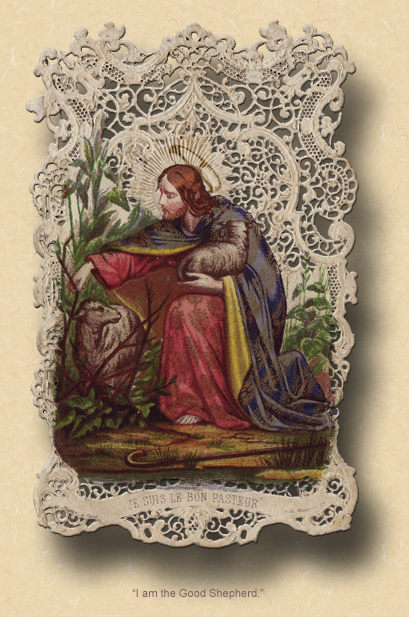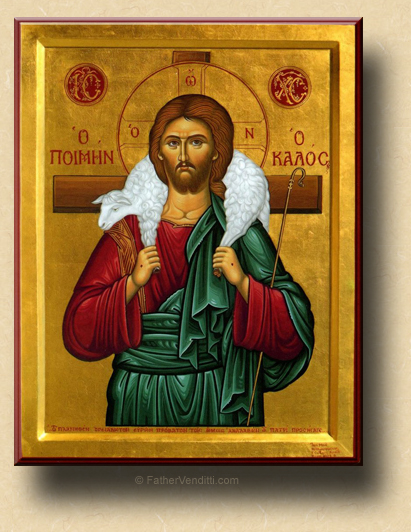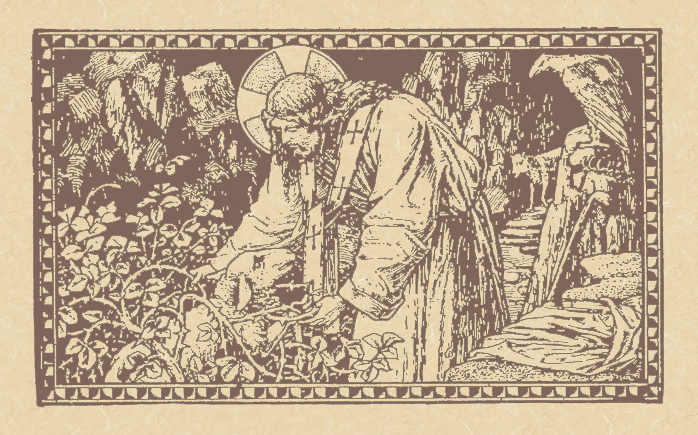Christ is the Good Shepherd, but Are We Good Sheep?
The Second Tuesday of Advent.
Lessons from the primary feria, according to the ordinary form of the Roman Rite:
• Isaiah 40: 1-11.
• Psalm 96: 1-3, 10-13.
• Matthew 18: 12-14.
The Second Tuesday of Advent; and, the Commemoration of Saint Melchiades, Pope & Martyr.*
Lessons from the dominica,** according to the extraordinary form of the Roman Rite:
• Romans 15: 4-13.
• Psalm 49: 2-3, 5.
• Matthew 11: 2-10.
FatherVenditti.com
|
 4:07 PM 12/10/2019 — There are few images of our Lord more pleasing to us than that of our Lord as the Good Shepherd. Our Lord's own words, as related to us by the Blessed Evangelist Matthew, betray why: the good shepherd is the one who searches tirelessly for the one stray sheep who is lost; but, I've often wondered what our Lord's disciples were thinking when they heard Him utter those familiar words. After all, we're accustomed to regarding our Lord's verbal images metaphorically; we have to because none of us here are actually making a living herding sheep, but our Lord used the metaphor because there were some hearing Him preach who actually did make their living that way, and they had to be somewhat puzzled. After all, a shepherd is a business man: he maintains a flock of sheep because he's in the business of producing wool; the sheep in his flock are products, not objects of love, and he's not going to put himself out personally for them. 4:07 PM 12/10/2019 — There are few images of our Lord more pleasing to us than that of our Lord as the Good Shepherd. Our Lord's own words, as related to us by the Blessed Evangelist Matthew, betray why: the good shepherd is the one who searches tirelessly for the one stray sheep who is lost; but, I've often wondered what our Lord's disciples were thinking when they heard Him utter those familiar words. After all, we're accustomed to regarding our Lord's verbal images metaphorically; we have to because none of us here are actually making a living herding sheep, but our Lord used the metaphor because there were some hearing Him preach who actually did make their living that way, and they had to be somewhat puzzled. After all, a shepherd is a business man: he maintains a flock of sheep because he's in the business of producing wool; the sheep in his flock are products, not objects of love, and he's not going to put himself out personally for them.
Our Lord expressed it somewhat differently: He makes the distinction, in John’s Gospel, between the shepherd who is hired to do the job and the shepherd to whom the flock actually belongs. The hired shepherd, who is the employee of someone else, isn't going to sacrifice himself when the wolf comes prowling; but, the shepherd who actually owns the sheep would naturally be a bit more concerned since it's his livelihood that the wolf is threatening.
All of these analogies are limping to us because, as I said, none of us are shepherds. That doesn't stop us, of course, from recognizing the beauty of our Lord's mental image; and, the image of the Good Shepherd who guides his sheep to safety remains one of our favorites, as it was for the Fathers of the Church, and the image of the Good Shepherd has become ingrained in the language of the Church:  whenever we speak of our Holy Father, the Pope, or of the office of the bishop or the role of the parish priest, the metaphor of the Good Shepherd naturally comes to our lips; and, we speak of the priest shepherding his flock without even thinking about it, so powerful is the image the Lord has given us with His words. whenever we speak of our Holy Father, the Pope, or of the office of the bishop or the role of the parish priest, the metaphor of the Good Shepherd naturally comes to our lips; and, we speak of the priest shepherding his flock without even thinking about it, so powerful is the image the Lord has given us with His words.
I have a classmate from the seminary who is now the bishop of a diocese out west; and, in our day they didn't give you a summer assignment in a parish like they do now days; you actually had to go out and get a job for the summer; and one year he got himself a summer job working as a shepherd. And on one occasion, the two of us were driving from Paris up to La Salette in the French Alps to visit the sight of the apparition there, and we had to stop several times to let a heard of sheep cross the road; and, after about the fourth time of having to stop for sheep on the road, he turned to me and said, “You know, sheep are really stupid.” And it's true; if you ever meet someone who's had anything to do with raising sheep, they'll tell you the same thing: they are the dumbest animals on the farm.
Which causes me to question whether the imagery used by our Lord in describing Himself as the Good Shepherd and us as His sheep might contain a hint of a rebuke. After all, there are other images used by our Lord in the Gospels that are a bit more flattering: a father and his children, a general and his soldiers. They all make the same point, but a shepherd and his sheep? Who wants to be regarded as a sheep?
The answer is, we do. We want to be our Lord's sheep because, as our Lord says, the Good Shepherd lays down his life for his sheep, opens to them the gate to safety and, as in today’s Gospel lesson, searching tirelessly for the one who is lost. Penetrating deep into that image, we realize that the Good Shepherd does these things without any hope of receiving anything in return. He does it because He knows that his sheep have absolutely no facility to protect themselves. And while we often use the Gospel of the Good Shepherd to expound on the qualities of what makes a good shepherd, using it to talk about priests and bishops and what they should be, it behooves us, I think, to consider what it is that makes a good sheep; and, what makes a good sheep is complete obedience and docility to the will of the Shepherd. The Shepherd is able to protect His sheep and keep them safe only when the sheep go where the Shepherd tells them to go. It's when the sheep decide to go off on their own and wander that the Shepherd loses sight of them and is no longer able to protect them.
So, on this day on which the Lord presents to us the image of the Good Shepherd, we should remember to pray for our Holy Father, the Pope, for our Bishop and for the priests that he has appointed to guide us in the ways of grace, and beg the Lord to help them be the best shepherds they can be. But we should also consider that we must do our part, for the good shepherd is only as good as the flock he tends; and, if we want our shepherds to be good shepherds, like our Blessed Lord, then we must resolve to be good sheep.

* Not much is known about Pope Saint Melchiades, except that he died peacefully after suffering during the persecution of Maximian in AD 314.
** In the extraordinary form, on ferias outside privileged seasons, the lessons from the previous Sunday are repeated.
|

